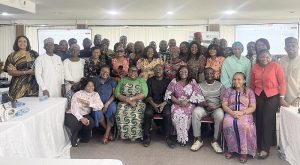Propcom+, a rural and agricultural market development programme, has pledged to promote climate-smart agricultural practices among smallholder farmers and small-scale entrepreneurs to support Nigeria’s food security agenda.

Dr Adiya Ode, Propcom+’s Team Lead, made the commitment during a media conference in Abuja on Saturday, July 6, 2024.
She emphasised promoting sustainable agricultural practices to enhance rural incomes and livelihoods, saying fostering resilience among the rural poor was crucial to Nigeria’s food production.
“The role of the media cannot be overemphasised. For the media to effectively bring critical agricultural development issues to the fore and report on progress, they need access to the right data and support to improve their content.”
She said propcom+ is designed to support economic growth in conflict and climate-affected regions of Nigeria.
According to Ode, its key objective is to revolutionise agriculture, ensuring people are resilient enough to adapt their livelihood strategies to climate change.
“Propcom+ will work as a market facilitator to identify constraints in market systems and implement interventions through three broad-based and interlinked pillars.
“They are scaling proven climate-smart interventions, piloting and scaling new business models, and supporting a strengthened enabling environment for sustainable food and land-use systems.”
Theresa Tella, Propcom+’s Communication Manager, noted the importance of media engagement, stating, “We need to shine a light on what Propcom+ is doing, as well as the efforts of media representatives.
“It’s about making our actions visible and appreciated by the masses.”
Tella outlined Propcom+’s communication objectives, which include establishing the programme as a leader in climate-smart agriculture, encouraging farmers to adopt best practices and technologies.
She added that working with policymakers would create an enabling environment for sustainable agriculture.
“The programme employs diverse channels, from traditional media to digital platforms, to ensure farmers receive necessary information, stressing the importance of face-to-face engagement and mass communication”.
Participants at the meeting emphasised the need for grants to media houses to ensure effective collaboration.
They underscored the importance of maintaining relationships established at the roundtable and suggested exploring various partnership models to keep the media engaged.
The 95 million pounds, eight-year UK International Climate Finance programme aims to support more than 4 million people, 50 per cent of whom will be women.
They will be adopting and scaling sustainable agricultural practices that increase productivity and climate resilience, while reducing emissions and protecting natural ecosystems.
The programme’s initial focal states include Kano, Jigawa, Kaduna, Edo, and Cross River, where it will deliver climate-smart agricultural interventions.
It also aims to address issues around deforestation and foster sustainable land-use management in some southern Nigerian states.
By Tosin Kolade
